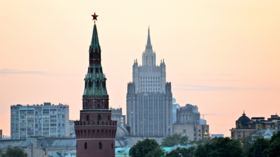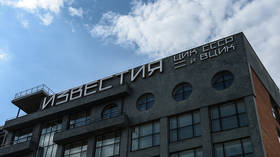Russia retaliates against EU’s latest media ban

Russia is restricting access to more than 80 EU media outlets on its territory that have been involved in spreading disinformation about the Ukraine conflict, the Russian Foreign Ministry announced on Tuesday.
According to a statement issued on the ministry’s website, the move comes in response to the EU’s latest crackdown on Russian media.
In May, the European Council banned four media outlets from reporting to audiences in the EU, including leading Russian news agency RIA Novosti, as well as newspapers Izvestia and Rossiyskaya Gazeta. The ban also applies to the Czech-based portal Voice of Europe, which the EU has described as a “Kremlin-linked propaganda network.” The restrictions on the media outlets came into force on June 25.
Brussels had already barred several Russia-linked media due to the Ukraine conflict and even made platforming their content illegal. For example, RT and Sputnik's broadcast licenses were suspended and websites were blocked across the EU.
“The Russian side has repeatedly and at various levels warned that politically motivated harassment of its journalists and unfounded bans on Russian media in the EU will not go unnoticed,” the ministry said, noting that Brussels and other EU capitals had chosen to take the path of escalation with their latest illegal ban despite warnings, forcing Moscow to take mirror countermeasures.
“Responsibility for such a development of events lies solely with the leadership of the European Union and the countries of the bloc that supported such a decision,” according to the ministry.
The list of EU media outlets that “systematically disseminate false information” about the progress of Moscow’s special military operation includes 81 organizations from 25 member states. They include Germany’s Der Spiegel, Spain’s El Pais, Italy’s La Stampa and La Repubblica newspapers, the French Agence France-Presse, Le Monde, Liberation, as well as the pan-European Politico and EUobserver.
Moscow may reconsider its decision in relation to the media outlets if restrictions on Russian media are lifted, according to the statement.
Moscow has accused Brussels of duplicity and attacking freedom of speech with its restrictions. The campaign to undermine the work of Russian news organizations long predates the Ukraine conflict and is aimed at preventing European citizens from hearing opinions that their governments deem undesirable, Russian officials have claimed.













